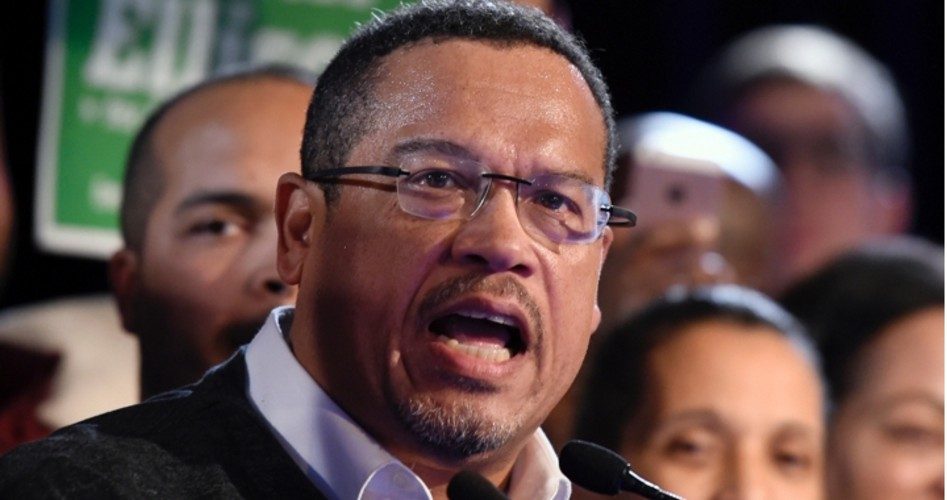
Minnesota Attorney General Keith Ellison (shown) has opted to raise the charge against Minneapolis police officer Derek Chauvin from third-degree murder to second-degree murder. The three other officers involved in the killing of George Floyd have also been charged with second-degree aiding and abetting manslaughter.
The new count is that Chauvin “caused the death of a human being, George Floyd, without the intent to effect the death of any person, while committing or attempting to commit a felony offense other than criminal sexual conduct in the first degree with force or violence or a drive-by shooting, namely assault in the third degree.”
Many observers fear that the increased charges could lead to an acquittal of Chauvin, risking more protests and even more rioting in American cities, although the jury could find Chauvin not guilty on the most serious charge — which would send him to prison for 40 years — but still conclude that he is guilty of the other two counts. According to Minnesota law, murder in the third degree is perpetrating [an] eminently dangerous act and evincing depraved mind, without regard to human life. First degree murder in Minnesota requires premeditation and intent, while a second-degree murder charge necessitates felonious intent. The original prosecutor evidently did not believe that Chauvin intended to cause Floyd’s death, but that his actions were both dangerous and deliberate, and resulted in the man’s death.
Chauvin was also charged with manslaughter in the second-degree, which is defined as culpable negligence creating unreasonable risk. The first charge of murder in the third degree carries a sentence of up to 25 years in prison, while the second charge could result in a prison sentence of up to 10 years. With the charge of second-degree murder, Chauvin could face 40 years in prison, if convicted.
Chauvin is white and Floyd is black, leading to accusations that the killing was racially motivated, although no evidence of racial animus toward African Americans by Chauvin has yet been made public.
First, there is the potential problem of Ellison prosecuting the case. Acting in his capacity as attorney general of the state, Ellison seized the case from Hennepin County prosecutor Mike Freeman, arguing that the local prosecutor had not handled the case well. But Ellison is perhaps one of the last prosecutors in the United States who should be handling the case, considering his extreme left-wing views, and his past membership in the anti-white Nation of Islam, led by Louis Farrakhan. (Ellison has since broken from his association with the group, also known as “the Black Muslims.”)
In 2006, Ellison told radio commentator Glenn Beck that Osama bin Laden no more represented Islam than Timothy McVeigh represented Christianity. Of course, bin Laden did claim to be a Muslim, while McVeigh was quite vocal that he was not a Christian, but rather an agnostic.
While serving in Congress, Ellison was the vice-chairman of the Congressional Progressive Caucus.
Rather than handle the case himself, Ellison, the first black attorney general in Minnesota history, would most likely be better off appointing a special prosecutor who would not carry the baggage of having been associated with an anti-white racist group.
Secondly, while the third-degree murder charge (essentially what is often called manslaughter) that Chauvin was originally charged with would much more likely lead to a guilty verdict, raising the charge to second-degree murder is going to be much more difficult to prove to a jury beyond the criminal standard of proof beyond reasonable doubt. While the jury could convict on the new charge, it is also possible that an emotional juror could believe the prosecutor is basically charging out of emotion or public opinion. Remember, it only takes one juror to hold out for acquittal and “hang” a jury, and cause a mistrial in the case. Even if the prosecutors went to trial again — as they most certainly would — this could still lead to violent reactions in the meantime.
In the original complaint entered by Freeman, Chauvin was charged with third-degree murder, a charge that does not require the state to prove either premeditation or intent to kill. Instead, all the state would have had to prove was that the actions of Officer Chauvin were intentional, and that those actions caused the death of George Floyd by perpetrating an act eminently dangerous to others and evincing a depraved mind, without regard for human life.
The defendant had his knee on Mr. Floyd’s neck for 8 minutes and 46 seconds in total. Two minutes and 53 seconds of this was after Mr. Floyd was non-responsive. One could also make the case that the action was without regard to Floyd’s life.
Ellison has also charged the three other officers who were at the scene with aiding and abetting manslaughter. Again, many can understandably conclude that the three officers were negligent in not pushing Chauvin off the prostrate and handcuffed Floyd, while Floyd pleaded that he could not breathe. One of the other officers, Thomas Lane asked Chauvin, “Should we roll him on his side?” but Chauvin responded, “No, staying put where we got him.” The three other policemen also face punishment of up to 40 years in prison.
Members of the Floyd family are still unhappy, instead calling for Chauvin to be charged with first-degree murder. Of course, that would be almost impossible to prove beyond reasonable doubt. Under that standard, the state would have to prove that Chauvin intended to murder Floyd, after giving it some thought. One should certainly sympathize with the Floyd family, but the homicide statutes in the state of Minnesota cannot — or should not be — changed by the prosecutor, the judge and the jury just to alleviate the emotional pain of a victim’s family. They are emotionally involved in Floyd’s death, but Ellison is not — or should not be. If he is motivated — or is perceived to be motivated — by bigotry against Chauvin for being white, then he needs to remove himself from the case.
Photo of Minn. Attorney General Keith Ellison: AP Images
Steve Byas is a university instructor of history and government and the author of History’s Greatest Libels. He may be contacted at [email protected].



